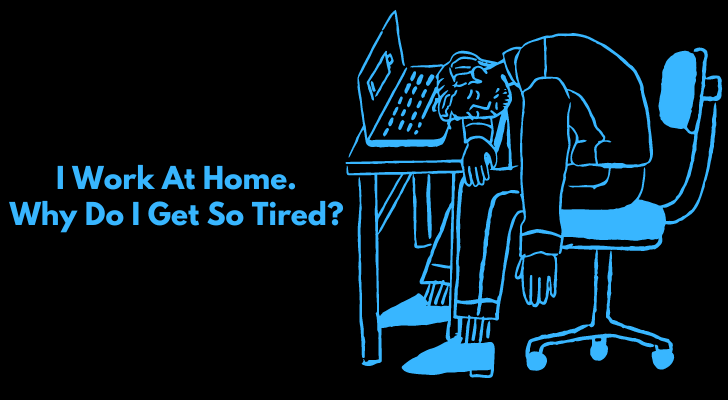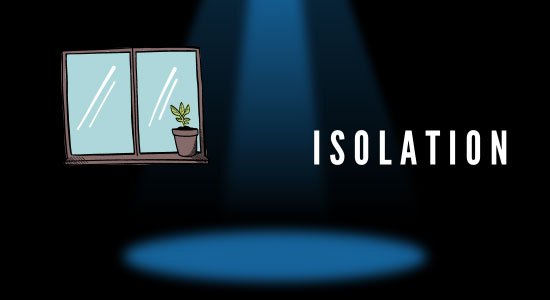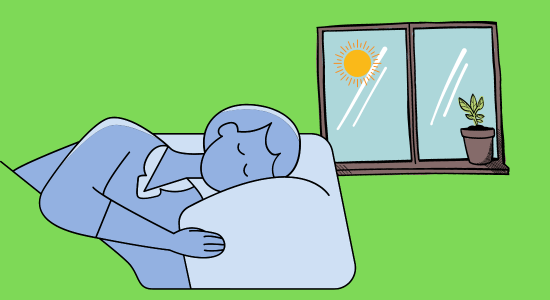Are you one of those lucky guys who get to work from the comfort of your own home? No more rushing through traffic, no more office politics - just you and your laptop, taking on the world from your cozy little corner. Sounds like a dream come true, right? But wait...why do you find yourself feeling so exhausted all the time? Shouldn't working at home be the epitome of relaxation and ease?
Well, let's put this stupid cycle to end - find some solutions to combat that pesky fatigue. Because even when you're working in paradise (a.k.a. your living room), tiredness can still sneak up on you. So let's get to the bottom of it all.

Did You Know?
- Increased Work Hours: Remote workers report working an average of 1.4 more hours per day than when in an office setting.
- Physical Inactivity: Up to 40% of remote workers say they exercise less since working from home, contributing to feelings of tiredness.
- Poor Ergonomics: Around 35% of people working from home have reported new or increased back, neck, or shoulder pain.
- Zoom Fatigue: Approximately 60% of remote workers experience "Zoom fatigue" due to excessive video calls, leading to mental exhaustion.
- Screen Time: Remote workers spend about 8-10 hours per day in front of their computer screens, increasing eye strain and fatigue.
Work-Life Balance, Seriously?
Not having to commute, no more stuffy office attire, or having to deal with annoying coworkers who steal your lunch from the fridge. You have extra hours in your day now. Better work-life balance, giving you the flexibility to spend more time with loved ones or pursue personal interests...
Remote work does offer more flexibility for sure. But it can actually blur the lines between work and personal life, making it harder to create a clear separation. You think you can manage it on your own good terms, but work-life balance can be more difficult when working from home because;
- No Physical Separation: In a traditional office setting, leaving the office physically creates a clear boundary between work and personal life. However, when working from home, that boundary isn't as defined, making it easier to continue working beyond regular hours.
- Flexible Schedules: While flexibility is a perk of remote work, it can also lead to irregular work hours, as you might be tempted to take breaks during the day and make up for it later in the evening.
- Increased Workload: Some remote workers may feel pressure to prove their productivity, leading to longer work hours and less time for personal activities.
- Distractions and Interruptions: Home environments can be filled with distractions, such as household chores or family members, making it challenging to fully focus on work during work hours or disconnect from work during personal time.
- Lack of Social Boundaries: Without the social cues of a physical office, colleagues and managers may have different expectations about response times, leading to a feeling of always being "on."
- Tech-Driven Culture: With continuous access to work-related communication tools and email on personal devices, it can be tempting to check work messages during personal time, further blurring the boundaries.
Did You Know?
- Disturbed Sleep Patterns: Nearly 30% of home workers report worsened sleep quality, often due to irregular work hours and increased screen time.
- Mental Health: About 50% of remote employees have experienced burnout while working from home, with tiredness being a key symptom.
- Lack of Routine: Over 20% of individuals working from home struggle to maintain a regular routine, affecting sleep and energy levels.
- Social Isolation: Around 70% of remote workers cite lack of social interaction as a challenge, which can lead to emotional fatigue.
- Decreased Job Satisfaction: Up to 25% of remote workers report lower job satisfaction, which can impact overall energy and motivation.
No Commuting = Lack of Exercise
Lack of exercise can indeed contribute to fatigue. Regular physical activity has numerous benefits for both physical and mental well-being. When you work from home and lead a sedentary lifestyle, you miss out on the natural movement that comes with a daily commute and working in an office environment.
When you think about it, exercise actually helps with fatigue;
- Increased Energy Levels: Exercise releases endorphins, which are natural mood lifters and can boost your energy levels.
- Improved Sleep Quality: Regular physical activity can improve the quality of your sleep, leading to better rest and reduced tiredness during the day.
- Enhanced Blood Circulation: Exercise improves blood flow, delivering more oxygen and nutrients to your muscles and organs, which can increase alertness and decrease fatigue.
- Stress Reduction: Physical activity is an excellent way to reduce stress and anxiety, which can contribute to feeling tired.
- Better Physical Health: Regular exercise improves cardiovascular health, strengthens muscles, and increases stamina, all of which contribute to overall energy levels.
Other Factors That Make You Tired

So lack of physical activity makes you tired, but other factors may be makig you slobby too.
- Monotony and Isolation: The repetitive nature of working from home, combined with limited social interaction, can lead to feelings of monotony and isolation, contributing to tiredness.
- Unhealthy Work Habits: Irregular work hours, skipping breaks, or overworking can lead to burnout and exhaustion.
- Screen Time and Eye Strain: Constantly staring at computer screens without proper breaks can strain the eyes and cause fatigue.
- Work Environment: A poorly optimized workspace at home, with inadequate lighting or uncomfortable furniture, can impact productivity and energy levels.
- Stress and Anxiety: The stress of remote work, pandemic-related worries, or other personal issues can drain energy and lead to fatigue.
- Sleep Disturbances: Changes in daily routines and heightened stress levels can disrupt sleep patterns, leading to poor sleep quality and tiredness.
- Distractions: Home environments can be full of distractions, making it challenging to maintain focus and leading to mental exhaustion.
- Lack of Commute Transition: The absence of a physical commute can make it difficult to mentally transition from work to personal time, leading to constant "work mode" and increased tiredness.
Did You Know?
- Reduced Physical Activity: Over 65% of remote workers feel they sit too much, contributing to decreased physical health and increased fatigue.
- Nutrition Habits: About 30% of people working from home find it harder to maintain healthy eating habits, affecting energy levels.
- Increased Stress: Nearly 40% of remote workers report higher stress levels than when working in an office, leading to fatigue.
- Workspace Inadequacy: Only 50% of home workers have a dedicated workspace, with the lack thereof contributing to discomfort and tiredness.
- Multitasking with Household Tasks: About 60% of remote workers juggle work and household responsibilities simultaneously, increasing mental load and exhaustion.
Solutions to Combat Fatigue When Working at Home
So you know that feeling exhausted while working from home is not uncommon. Then let's start doing something about it, little by little. If you are running your own business, then you can control your daily routine in any way you like. Let's rebuild the routine.
Go Out, Have Lunch, and Have a Nap

Taking breaks and having a balanced routine that includes getting outside, having meals, and taking naps will be awesome for your overall well-being. Here's how each of these activities can contribute to reducing tiredness and enhancing productivity:
1. Going Outside: Get outside and spend time in nature. You'll get reasonably tired - physically, but not mentally, which will be good.
- Mental Refreshment: A change of environment can help clear your mind and reduce mental fatigue.
- Exposure to Natural Light: Natural light helps regulate your circadian rhythm and can improve your mood and alertness.
- Physical Activity: Going for a walk or engaging in outdoor activities can provide some exercise and boost energy levels.
- Stress Reduction: Spending time in nature has been shown to lower stress and anxiety levels.
2. Having Lunch: Taking a proper lunch break is a must for maintaining energy levels and productivity:
- Nutrition: Having a balanced and nutritious meal provides your body with the fuel it needs to function optimally.
- Blood Sugar Regulation: Eating regular meals helps stabilize blood sugar levels, preventing energy crashes.
- Mental Recharge: Taking a break from work and focusing on enjoying your meal can help you return to work with a refreshed mind.
3. Having a Nap: Believe me, short naps, often called power naps, will combat tiredness:
- Restoration: A brief nap can restore alertness and increase cognitive function.
- Stress Reduction: Napping can help reduce stress and improve overall well-being.
- Boosting Memory and Learning: Naps have been linked to better memory consolidation and learning retention.
But I must add, you need to approach napping mindfully:
- Nap Duration: Keep naps short, ideally around 20-30 minutes, to avoid grogginess and disruption of nighttime sleep.
- Timing: Try to schedule naps earlier in the day, preferably during the mid-afternoon, to prevent interference with nighttime sleep.
Ensure that your break times are structured - go out around 11am-ish, have lunch at noon, then take a nap soon afterward. So you can still adhere to a regular work schedule to maintain productivity and avoid overextending breaks.
Did You Know?
- Overworking Tendency: Approximately 45% of remote workers say they have a hard time stopping work, leading to longer hours and tiredness.
- Productivity Pressure: Around 35% of home workers feel pressured to prove their productivity, contributing to overwork and subsequent fatigue.
- Lack of Natural Light: Up to 40% of individuals working from home report not getting enough natural light, which is essential for maintaining energy.
- Increased Caffeine Consumption: About 50% of remote workers consume more caffeine while working from home, which can disrupt sleep patterns and lead to tiredness.
- Digital Overload: 70% of remote employees report an increase in digital communication, leading to information overload and cognitive fatigue.
Coffee?
Take some caffeine, but don't take too much - that's what they usually say. I would stick to that advice. I think controlling caffeine intake can have a significant impact on managing tiredness.
While caffeine can provide a temporary energy boost and increased alertness, excessive consumption will affect sleep quality, hence contributing to fatigue. So what you can do will be;
- Limit Total Daily Intake: Be mindful of how much caffeine you consume throughout the day. The general guideline is to keep it below 400 milligrams (about four 8-ounce cups of brewed coffee) for most healthy adults.
- Avoid Caffeine Close to Bedtime: No need to explain.
- Monitor Hidden Sources: Remember that caffeine is not just found in coffee and tea but also in other beverages (e.g., energy drinks, sodas) and some foods (e.g., chocolate). Pay attention to the caffeine content in the food/drink you consume.
- Stay Hydrated: Drink plenty of water throughout the day to stay hydrated, as dehydration can contribute to feelings of tiredness.
- Gradually Reduce Intake: If you currently consume a lot of caffeine, consider gradually reducing your intake to avoid withdrawal symptoms like headaches or irritability.
- Be Mindful of Tolerance: Regular caffeine consumers can develop a tolerance, meaning they need more caffeine to achieve the same effects. Consider occasional caffeine breaks to prevent tolerance buildup.
- Listen to Your Body: Pay attention to how your body reacts to caffeine. If you feel slightly freaky - which causes jitteriness or anxiety, cut it back.
- Avoid Caffeine Dependency: Don't depend on caffeine as a primary source of energy. Proper sleep, nutrition, and stress management should be the foundation of your energy levels.
Be Grateful
You know, gratitude is a powerful mindset that brings many benefits. Be grateful for working from home. Be grateful that you earn your living doing what you love to do. Tell yourself that you have plenty of time to control yourself so you're not tired. All of that will improve your well-being.
It's your mind that allows you to be more productive, enjoy activities, think clearly, and have better physical health. We can all practice gratitude by keeping a journal, thanking others, or simply reflecting on things we're thankful for. Being grateful brings positivity, resilience, and optimism to our lives. So you're not getting tired. You have a great life.
How I "Finally" Make Over $7,000 Monthly Income
"The most valuable thing I've ever done!"



